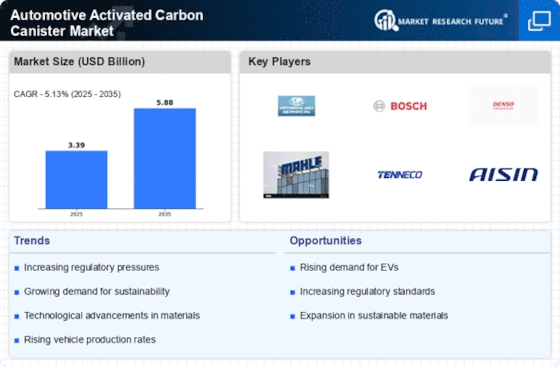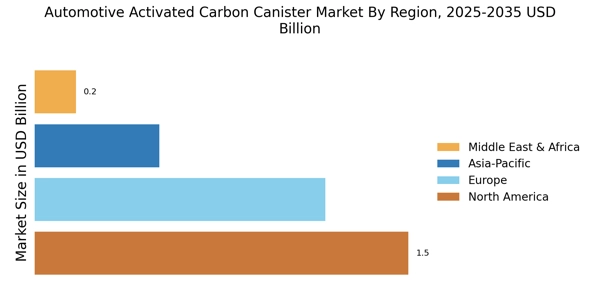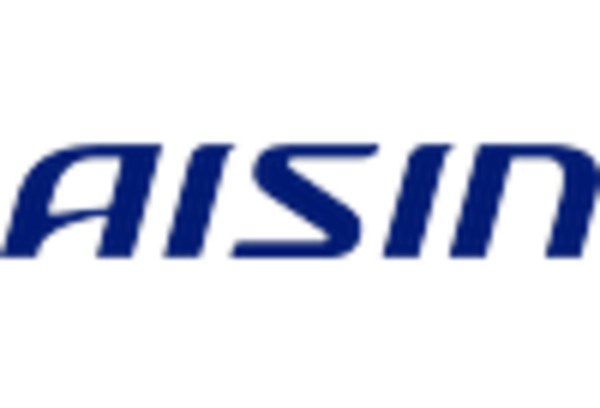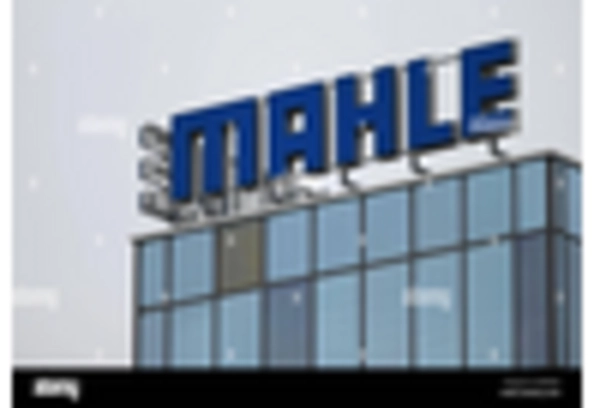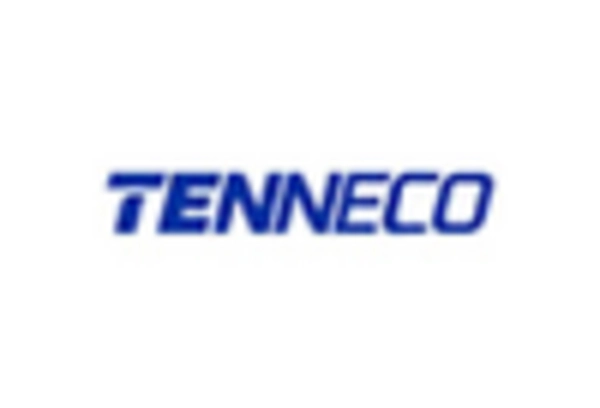Impact of Electric and Hybrid Vehicles
The rise of electric and hybrid vehicles is reshaping the Automotive Activated Carbon Canister Market. While these vehicles are designed to minimize emissions, the transition phase still necessitates the use of activated carbon canisters in conventional vehicles. As hybrid models gain traction, the demand for canisters remains relevant, particularly in vehicles that utilize both electric and internal combustion engines. Furthermore, the automotive industry is witnessing a shift towards integrating activated carbon canisters in new vehicle designs to enhance overall efficiency. This trend suggests that even as electric vehicles become more prevalent, the market for activated carbon canisters will continue to thrive, albeit in a transformed capacity. Analysts predict that the market will adapt to these changes, potentially leading to new applications and innovations in canister technology.
Rising Fuel Prices and Economic Factors
Economic factors, particularly rising fuel prices, are influencing the Automotive Activated Carbon Canister Market. As fuel costs escalate, consumers are becoming more discerning about vehicle efficiency and emissions. This economic pressure is driving demand for vehicles that utilize activated carbon canisters, as they contribute to improved fuel economy by capturing evaporative emissions. Manufacturers are increasingly focusing on developing vehicles that not only comply with regulatory standards but also offer better fuel efficiency, thereby appealing to cost-conscious consumers. The market for activated carbon canisters is expected to benefit from this trend, as more automakers incorporate these technologies into their designs to meet consumer expectations. Analysts suggest that this economic dynamic could lead to a sustained increase in demand for activated carbon canisters in the coming years.
Technological Advancements in Materials
Innovations in materials science are playing a pivotal role in shaping the Automotive Activated Carbon Canister Market. The development of more efficient and durable activated carbon materials is enhancing the performance of canisters, leading to better emission control. Recent advancements have introduced new composite materials that not only improve adsorption capacity but also reduce the overall weight of the canisters. This is particularly relevant as automotive manufacturers strive to improve fuel efficiency and reduce emissions. The integration of nanotechnology in the production of activated carbon is also emerging, potentially revolutionizing the market. As these technologies mature, they are expected to drive down production costs while enhancing the effectiveness of activated carbon canisters, thereby expanding their application across various vehicle types.
Consumer Preferences for Eco-Friendly Solutions
Consumer preferences are increasingly leaning towards eco-friendly automotive solutions, significantly influencing the Automotive Activated Carbon Canister Market. As awareness of environmental issues grows, consumers are more inclined to choose vehicles that incorporate advanced emission control technologies. Activated carbon canisters are viewed as a critical component in reducing harmful emissions, making them a desirable feature for environmentally conscious buyers. This shift in consumer behavior is prompting manufacturers to prioritize the integration of activated carbon canisters in their vehicle designs. Market Research Future indicates that vehicles equipped with such technologies are likely to see higher sales, as consumers actively seek out options that align with their values. This trend is expected to bolster the market, as manufacturers respond to the demand for greener automotive solutions.
Regulatory Compliance and Environmental Awareness
The Automotive Activated Carbon Canister Market is experiencing a surge in demand due to stringent regulations aimed at reducing vehicular emissions. Governments worldwide are implementing laws that mandate the use of activated carbon canisters to capture evaporative emissions from fuel systems. This regulatory push is not merely a trend; it reflects a broader commitment to environmental sustainability. As consumers become increasingly aware of their carbon footprint, the demand for vehicles equipped with advanced emission control technologies, including activated carbon canisters, is likely to rise. In fact, the market for activated carbon canisters is projected to grow at a compound annual growth rate of approximately 5% over the next five years, driven by these regulatory frameworks. Consequently, manufacturers are compelled to innovate and enhance their product offerings to comply with these evolving standards.


